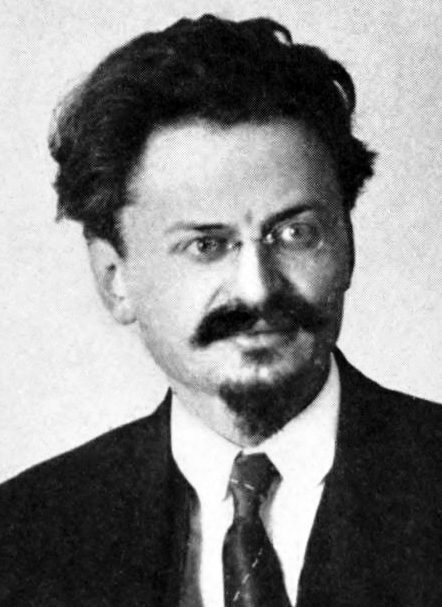Lev Trotsky frasi celebri
citato in "Prima di morire – Appunti e note di lettura", Giangiacomo Feltrinelli Editore, 1998
Lev Trotsky Frasi e Citazioni
Origine: Da un reportage di Georges Simenon, 1933; citato in Simenon: «Scusi Trotskij, permette tre domande?» https://web.archive.org/web/20160101000000/http://archiviostorico.corriere.it/2003/novembre/28/Simenon_Scusi_Trotskij_permette_tre_co_0_031128057.shtml, Corriere della Sera, 28 novembre 2003.
Origine: Citato in Prima di morire – Appunti e note di lettura, Feltrinelli, 1998.
“La fede senza lavoro è morta.”
Origine: Citato in Max Eastman, Il giovane Trotsky (1925), traduzione di Roberto Cruciani, Massari, 2006, p. 64. ISBN 8845702316
citato in "Prima di morire – Appunti e note di lettura", Giangiacomo Feltrinelli Editore, 1998
dall'articolo A proposito del libro di Eastman – Dopo la morte di Lenin, Bolscevik, n. 16, 1° settembre 1925
“L'idea umanitaria moraleggiante è la più sterile di fronte al processo della storia.”
citato in Focus n. 110, p. 175
Citazioni di Lev Trotsky
Origine: Citato in AA.VV., Il libro della politica, traduzione di Sonia Sferzi, Gribaudo, 2018, p. 244. ISBN 9788858019429
Origine: Storia della rivoluzione russa, p. 380
Origine: Storia della rivoluzione russa, p. 316
Origine: Storia della rivoluzione russa, pp. 278-279
Origine: Storia della rivoluzione russa, pp. 98-99
Lev Trotsky: Frasi in inglese
Statement of 1924 on Joseph Stalin's growing powerbase, in Stalin, An Appraisal Of The Man And His Influence (1966); also in Stalin's Russia 1924-53 by Michael Lynch, p. 18
“The life of a revolutionary would be quite impossible without a certain amount of "fatalism."”
Foreword (1929) http://www.marxists.org/archive/trotsky/1930/mylife/foreword.htm
My Life (1930)
Origine: The Revolution Betrayed (1936), p. 40 in Doubleday, Doran & Company edition (1937)
“We Marxist communists are profoundly opposed to the anarchist doctrine. This doctrine is erroneous”
Order by the commissar for military affairs - on the murder of count Mirbach
How the Revolution Armed (1923)
Misattributed
Contesto: : In a later work, Just and Unjust Wars: A Moral Argument with Historical Illustrations (2000) by Michael Walzer, the author states: War is most often a form of tyranny. It is best described by paraphrasing Trotsky's aphorism about the dialectic: "You may not be interested in war, but war is interested in you." This statement on dialectic itself seems to be a paraphrase, with the original in In Defense of Marxism Part VII : "Petty-Bourgeois Moralists and the Proletarian Party" (1942) https://www.marxists.org/archive/trotsky/idom/dm/32-goldman2.htm — where Trotsky publishes a letter to Albert Goldman (5 June 1940) has been translated as "Burnham doesn't recognize dialectics but dialectics does not permit him to escape from its net." More discussion on the origins of this quotation can be found at The Semi-Daily Journal of Economist Brad DeLong: Fair and Balanced Almost Every Day http://econ161.berkeley.edu/movable_type/2003_archives/002422.html.
As quoted in The Cheka : Lenin's Political Police (1981) by George Leggett, p. 54
Into the Fight Against Famine
6. The Kulaks - bulwark and hope of the counter-revolution
How the Revolution Armed (1923)
Origine: Fascism: What It Is and How to Fight It (1944), Ch. 3
Excerpts of Trotsky’s interview with Jewish Telegraphic Agency (18 January 1937); as quoted in Trotsky and the Jews (1972) by Joseph Nedava, p. 204
https://www.marxists.org/archive/trotsky/1925/07/lenin.htm,Letter on Max Eastman's Book, July 1, 1925
Manuscript from 1940, as translated in Writings of Leon Trotsky edited by George Breitman
Fascism: What It Is and How to Fight It (1944)
Bulletin of the Opposition, October 1933. Quote from Harpal Brar's Trotskyism or Leninism? p. 625
During a 1921 meeting with American businessman Armand Hammer, as quoted in Hammer: Witness to History by Hammer and Neil Lyndon (1988), p. 160
Ch. 11 https://www.marxists.org/archive/trotsky/1936/revbet/ch11.htm
The Revolution Betrayed (1936)
Stalin: An Appraisal of the Man and his Influence (1941), translated by Charles Malamuth, p. 412
Literature and Marxism (1924)
“Bureaucracy and social harmony are inversely proportional to each other.”
Origine: The Revolution Betrayed (1936), p. 41
